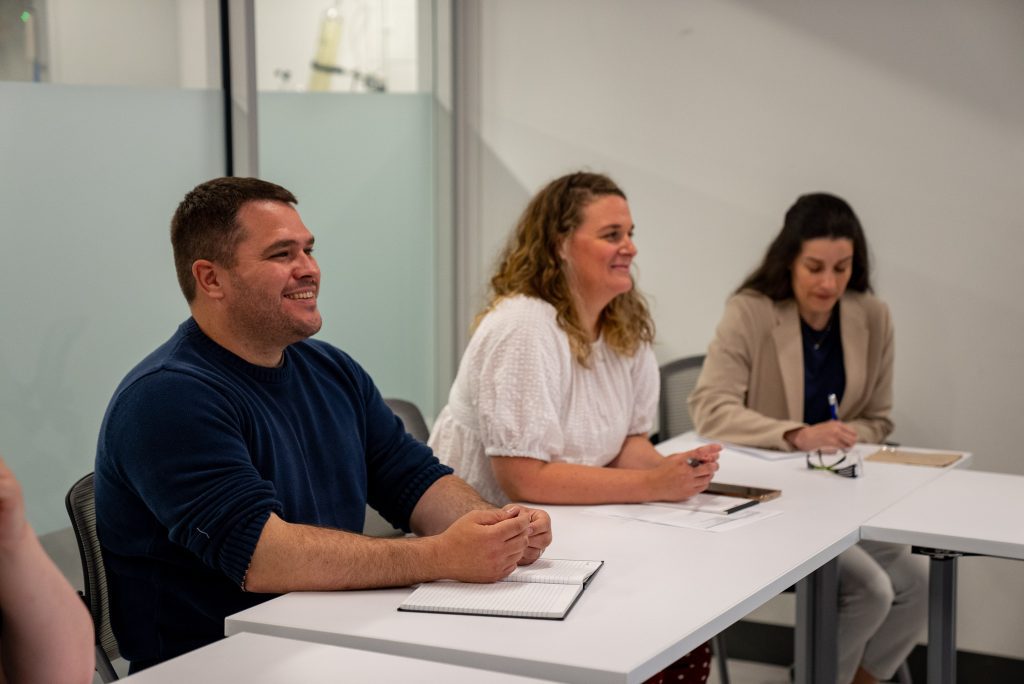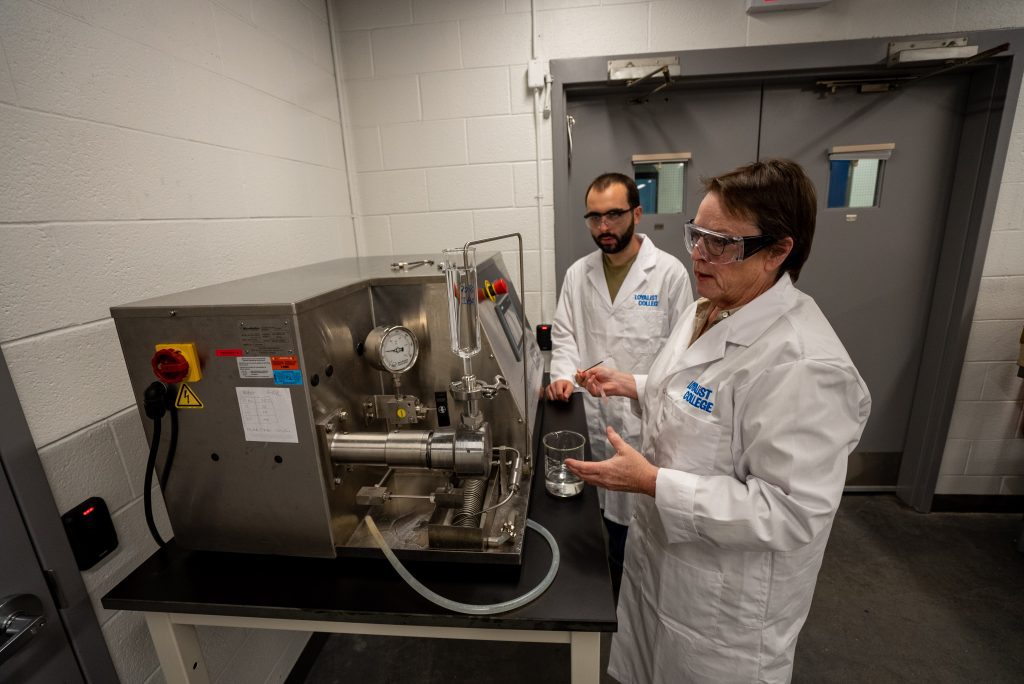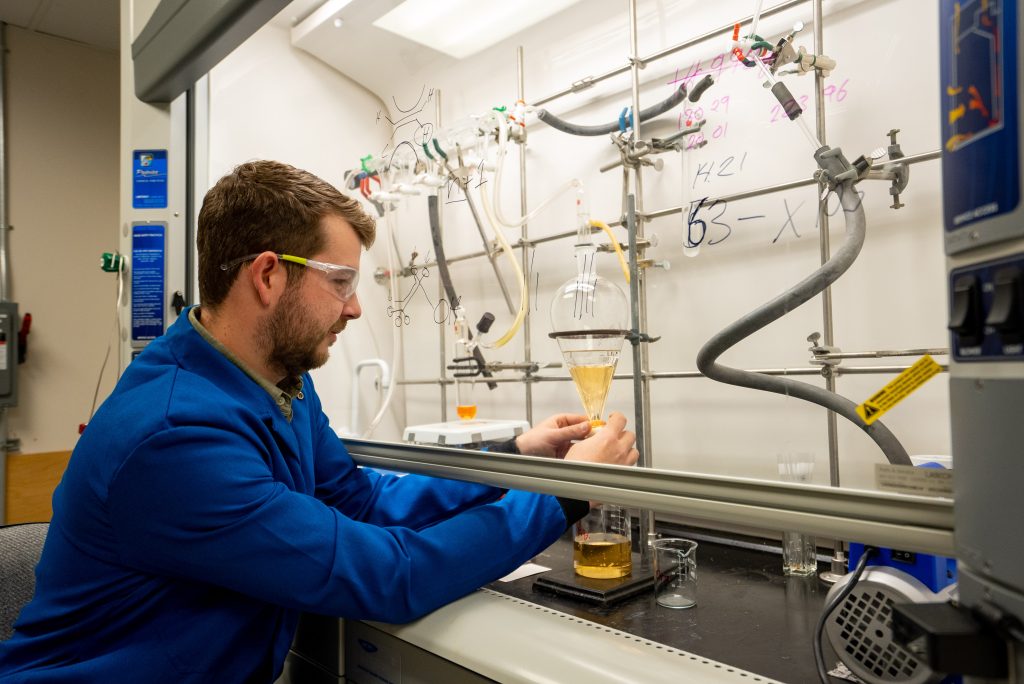Meet Our Research Team – Josh Powles

Josh Powles is a Researcher at the Centre for Natural Products and Medical Cannabis and has been teaching at Loyalist College since 2014.
Josh grew up in the Quinte area in Ontario, and part of his lifestyle encouraged him to interact with nature, pushing his initial interest in sciences/biology.
His attraction to research became stronger when Josh stumbled upon the use of a protein during his PhD, which opened a pathway to the development of intellectual property.
While working on this potential technology, he collaborated on multiple projects related to cancer treatments, antibiotic resistance, biofilm development, and genetic modification of various organisms.
Josh is now working with tissue culture and molecular techniques at the Centre – striving to master new ways to grow and develop plants for the creation of drugs and other biomolecules.
He is very passionate about molecular biology and believes that people can find solutions to almost anything by studying and understanding our environment, plants and animals. That is why Josh is also committed to Drinking Water Source Protection, serving as a Quinte Region Source Protection Committee member through the Quinte Conservation Authority.
Josh received his Master of Science (MSc) and PhD in Molecular Biology from Queens University.
To learn more about Josh’s journey as a researcher, keep reading the interview below.
You are a professor and a researcher. What is the most challenging thing about your dual role?
Balancing the two is intrinsically tough.
When I have free time, I must balance the development of projects and my lessons. Luckily, since I am teaching within the same realm of my research, I am able to bridge the two aspects of my job together.
Another hard situation is providing students opportunities past my classes, with finite student research placements. I always want to provide conditions to grow and develop within research to every one of my students.
What do you like most about doing research?
Research allows me the opportunity to push myself and learn more about a topic, and new techniques.
In addition, research allows me to maintain my skill set, and it provides me with the ability to learn novel skills that I can implement into my teaching.
I am able to network with industry experts, understand what types of jobs and skills they are pursuing and help develop those within my courses.
What inspired you to become involved in research?
Molecular biology and genetics have always been interesting and exciting fields for me. When I was completing my undergrad, I met a professor who shared similar interests and had the same passion I had developed.
This naturally pulled me into an honours project and the pathway to grad school. Seeing my work advance a field within molecular biology became addictive, pushing me to learn more and develop studies.
Did you have a teacher at school, college or university that inspired you and if so, how?
My high school biology teacher was the first to push and develop my passion for biology. When in university, my supervisor was the one that really pushed me and allowed me to learn so much about the topic. He became more than just an instructor, taking on a mentor-like role in my life.
How would you encourage your students to become involved in research?
Being open about my passion and excitement in research is the first step. I get to know my students, what they are interested in, and what topics they like most, and incorporate this into my lessons.
This pushes me to learn more about their interests and challenges me to build upon their passion within my courses.
What would you tell your students are the most important skills of a researcher?
Follow what you like the most. Being passionate in your field is the key to happiness and a successful career.
Can you describe your area(s) of research interest?
Anything with molecular biology is my biggest passion.
Jumping deeper into that broad category, medicinal development, plant molecular biology, and genetics are where my true interests are. Modifying cells to understand how the complexities of their biology work and how treatments can create desired outcomes is very exciting.
How did you first become interested in this area of research? What was your “ah ha” moment?
During my PhD, I stumbled upon the use of a protein I was studying, which opened a pathway to the development of intellectual property.
While developing this potential technology, I got to branch out and work with other labs on various projects, including cancer treatments, antibiotic resistance, biofilm development, and genetic modification of various organisms.
What was your favourite project you’ve ever worked on? Why?
The development of intellectual property during my PhD.
This was my first step into the medicinal side of molecular biology and when I truly understood that most solutions to our global problems today lay in wait with research.
Molecular biology is a young and emerging field, and simply by studying and understanding the plants and animals around us, we can find solutions to almost anything.
Why is this area of research relevant for the ordinary citizen? What are the possible real-world applications?
We live in interesting times, where we have never relied so much on biology.
Molecular biology holds the secrets to new drugs and treatments, unlocking the potential of photosynthesis to develop novel power generation and provide solutions to climate change.
Everything we do in our lives has a root in biology, from agriculture, medicine, learning, and leisure activities.
Do you have another area of research that you’re currently not working on that you would like to?
As a molecular biologist, I have always used chemistry as a tool to achieve my outcomes.
Applied chemistry and biochemistry have intrigued me and is a field I have been moving into more and more every year. These fields would allow me to better utilize my skills and abilities to reach out further and build projects.
How do you keep current in your research area?
I always read and keep an eye on advances in research. As an educator, I am always looking for new and up-to-date material to incorporate into my lessons, which means I have to do routine literature searches.
I tend to gravitate to online resources where people share novel studies and discuss the science behind them.
What would you like to be the ultimate outcome of your research?
Ultimately, I want to make a positive impact on the world. I want to share my interest in biology with everyone and help advance our understanding of the natural world.
If you were forced to do something else for a living and could do anything, what would you like to do?
I would say becoming a chef.
Cooking is very similar to chemistry and research and a hands-on job.
And on top of that, you get to taste amazing dishes! I usually cook in my house, and it is fun to try new things and challenge myself, although my kids can be picky!
If you could learn to do anything, what would it be?
I simply welcome learning anything possible. Learning is a lifelong career and a skill which you can always master.
I am truly happy with what I am currently doing. Teaching growing minds and being in the lab is what I have always wanted.
Applying molecular techniques to medicinal applications is a field I stepped into late in my education and is something I would always welcome to learn more about.
What is something you learned in the last week?
COVID-related research has dominated science for the last few years. But something that jumped out in my mind is related to some studies linking the use of cannabinoids in potentially treating COVID-19 pathology.
This research circles back to how the biology of things we have known for a long time still holds numerous mysteries and can take on novel uses in society.



